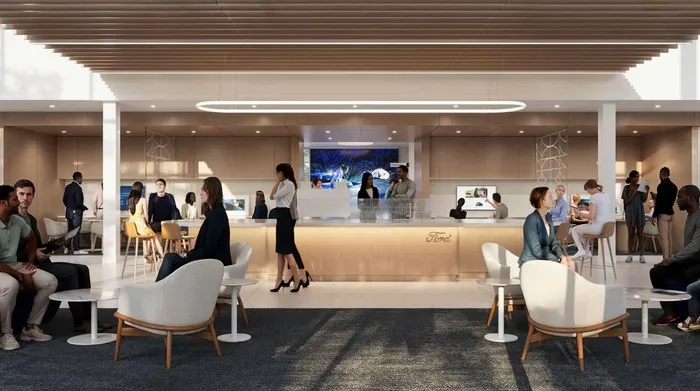Ford dealerships to invest over R900 million in South Africa despite volatile vehicle market
Motor Industry

A diagram of an example of a social area that that will typically form part of the entrance of the newly designed or upgraded Ford dealerships across South Africa.
Image: Ford South Africa
Ford dealership owners in South Africa have committed more than R900 million over three years on new and upgraded dealerships, reaffirming the local motor manufacturer’s long-term commitment at a time when other manufacturers may be lowering their presence in the market.
Ford Motor Company Africa President, Neale Hill, speaking at the opening of a new multi-brand dealership in Paarden Island, Cape Town on Thursday, said this investment was against the backdrop of great flux and uncertainty in the South African vehicle industry.
This as seven local manufacturers were facing growing competition from models imported by a fast increasing number of China and Indian manufacturers, particularly in the under R500 000 vehicle market.
Many vehicles exported from South Africa will soon also likely face additional import tariffs in the US - Ford South Africa exports to markets in Europe - while the industry would also have to adapt to shifting global trends towards electric, hybrid, or other combinations of vehicle renewable energy systems.
In addition, the announcement in June of the closure of the Goodyear tyre manufacturing facility in Kariega by December 2025 was an indication of the toll that years of anemic economic growth was having on the South African market.
Furthermore, South Africa’s high-interest rate environment means motorists who bought a new car just before the COVID-19 pandemic were now paying about 30% more for the same vehicle.
“We have seen from other parts of the world that lost production is very rarely restored. It will be very sad to lose further production capacity in South Africa, and for goods to be imported when previously they were made locally,” Hill said.
The motor industry supports about 450 000 jobs in South Africa.
“While some brands may be consolidating or rationalising, Ford is evolving its dealer business to meet the needs of modern customers. That’s because our dealer model works; we believe it’s a truly sustainable business,” said Hill.
On the investment by the dealers, he said: “That’s not us saying we believe in Ford. That’s our partners endorsing it; a clear vote of confidence in our direction, our people, and, most importantly, our products and our customers.”
There are currently 118 Ford dealerships across South Africa, Botswana, Namibia, and Eswatini, and the network ranks among the top three by size in South Africa.
Hill said rather than focusing on outright scale, Ford’s strategy centred on right-sizing facilities, optimising location, improving digital readiness, and upgrading aftersales infrastructure to better serve tech-savvy, time-conscious customers.
“It’s an approach in tune with changing global retail trends and designed to future-proof the brand, its dealer network, and ultimately the customer experience,” he said.
This year, 20 new dealer projects and facility upgrades are starting or scheduled for completion. Ford’s dealer network supports over 10 000 direct jobs in South Africa.
Ford South Africa network operations manager, Kuda Takura, said the investments by the dealers were likely to yield sustainable returns for the dealer network.
He said Ford’s 2023–2024 Global Retail Assessment study showed a strong correlation between upgraded retail design and business success.
“Retail facilities that align with Ford’s global design standards consistently outperform non-upgraded sites on key customer-facing metrics,” he said.
Ford South Africa’s strategy to concentrate on segments in the premium market sees its Ranger Double Cab remaining a top performer in both domestic and export markets - it currently holds the position of South Africa’s best-selling double cab.
Dealer sales accounted for over 85% of all new vehicle sales in South Africa in the first half of the year, with 236 914 units sold year-to-date - a 12.9% increase that closely mirrors the overall market growth of 13.6% compared to the same period last year.
In June, Ford recorded the second-largest growth rate in the Top 10 market share, rising by 0.5 percentage points to secure a strong fourth place in June overall, holding 6.5% of the new vehicle market.
Hill said Ford’s growth was driven largely by Ranger volumes, in a market where growth has been predominantly fueled by the passenger car segment.
BUSINESS REPORT